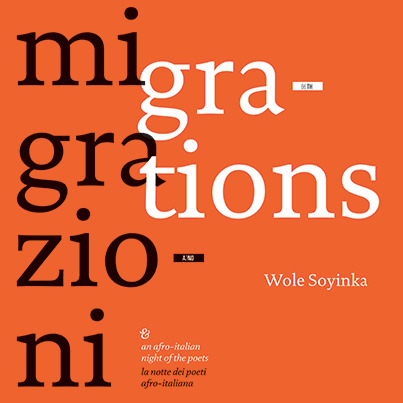
Migrazioni/Migrations
Migrazioni/Migrations (2016) is a poetry and photography book created by Nigerian playwright Wole Soyinka – the first African author to have won the Nobel Prize for Literature in 1986. Edited by Alessandra Di Maio, academic and translator of Soyinka’s works in Italian, this anthology focuses on the reality of migration by exploring the routes that connect Italy and Africa, Nigeria specifically.
This comprehensive work comprises 32 poets (16 Italian and 16 Nigerian) who engage in conversation focusing on the theme of migration in its multiple declinations – death, life, memory, war, entwining past and present. Alternating to the poems, a series of black and white photographs (taken by Akitunde Akinleye and George Osodi) of stunning visual power act as a complementary narrative. Throughout the book we can read 16 poems, their total number referring to Yoruba’s tradition, the ethnic group Soyinka belongs to, in which the number 16 represents the cosmic order.
In addition to these 16 poems, there is one last poem, the 17th, written by Soyinka himself and dedicated to the Yoruba God of Chaos. This composition is accompanied by a counter piece written by Italian actor and playwright Dario Fo, who also ‘donated’ 2 of his paintings to the anthology, which represent the relationship between Italy and Africa.
Among the poets that have participated in this literary work, just to cite a few of them, there are new Afropolitan voices like Chris Abani and Jumoke Verissimo, as well as renowned Nigerian poets such as J.P. Clark-Bekederemo and Odia Ofeimun. Alongside them, some of the Italian poets that took part in the collection are Ascanio Celestini, Erri De Luca, Silvia Bre and Stefano Benni.
Initially, both photographs and poems were part of an exhibition installed at the Lagos Black Heritage Festival, whose artistic curator is Wole Soyinka. Every year, Nigeria organises the festival in partnership with another country, with whom there are cultural affinities and relationships. In 2012, the chosen partner was Italy because of its central position in relation to the African diaspora in the Mediterranean area. A specular exhibition was also held in Palermo, Sicily, Italy – a city close to Africa both culturally and geographically – during “An Afro-Italian Night of the Poets” (which is also the collection’s subtitle).
This peculiar anthology is a bridge between two continents that have been connected for centuries by Mediterranean routes. The vast in-between space made up of water, a map of commercial roads in the past, is now the locus of desperation, hope and death, an impassive spectator of an unprecedented, and yet too well known, tragedy: the brutality of some lucky ones that remain deaf to the torment of migrants and refugees seeking safety on the other side. An artistic work and a memorial of/for all those voices lost at sea, today like yesterday.
